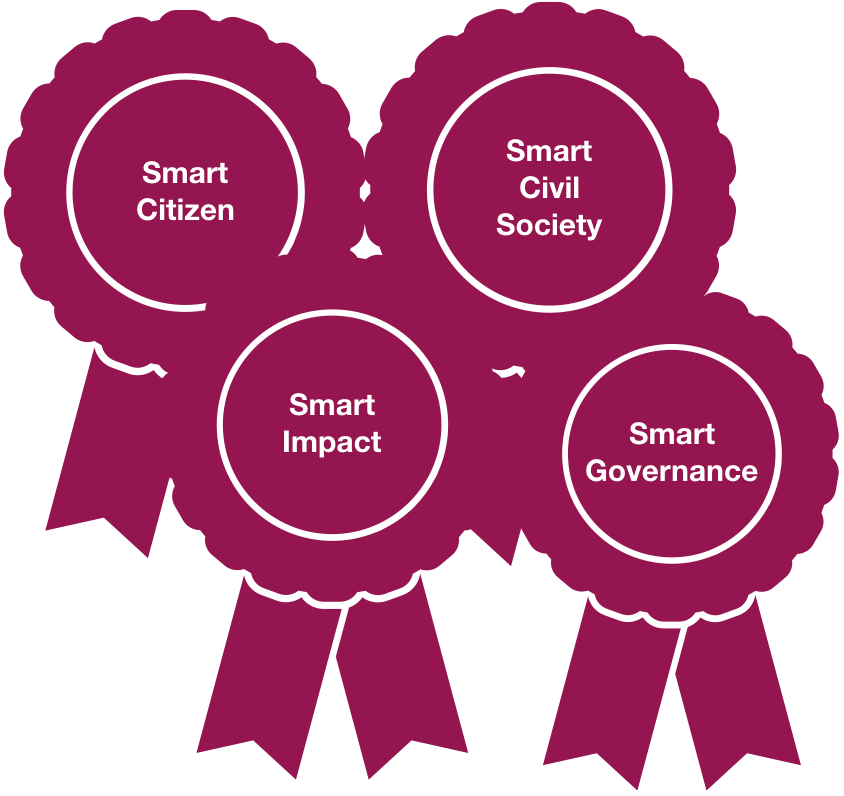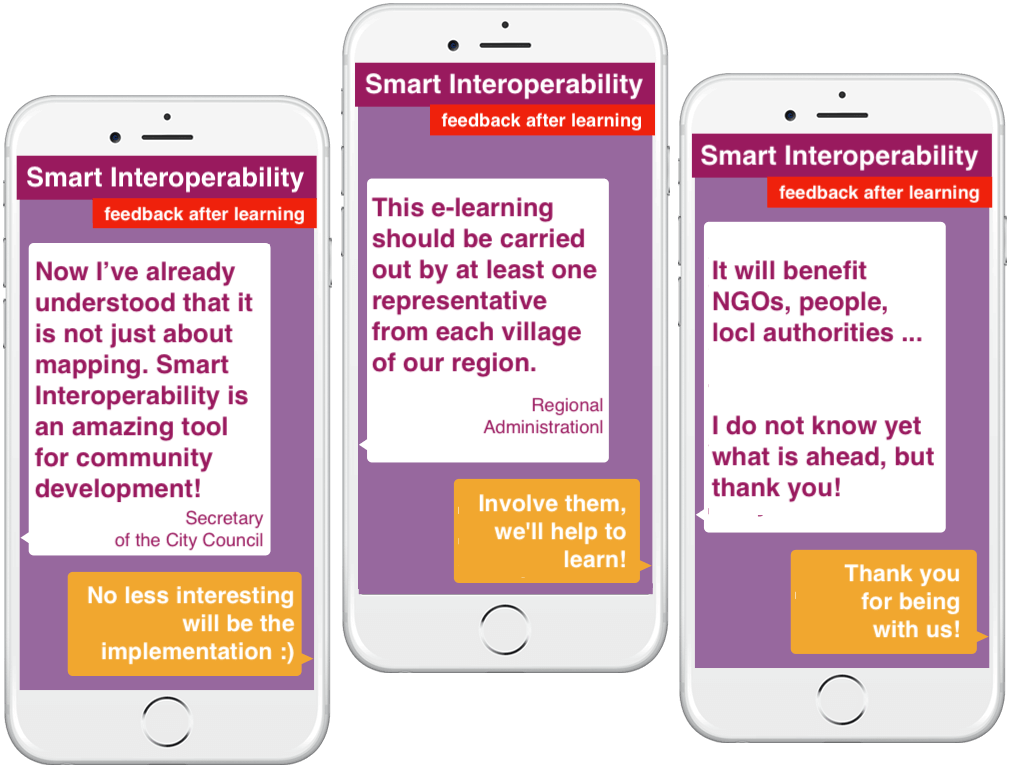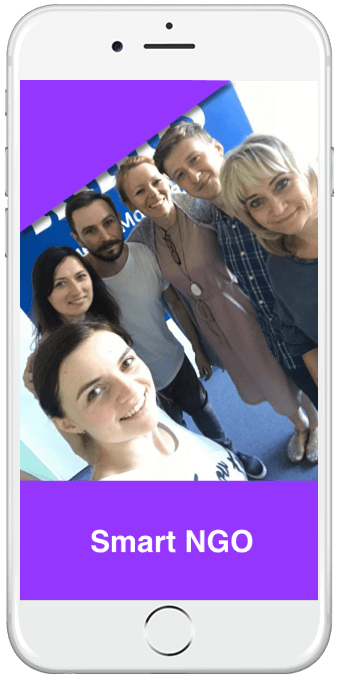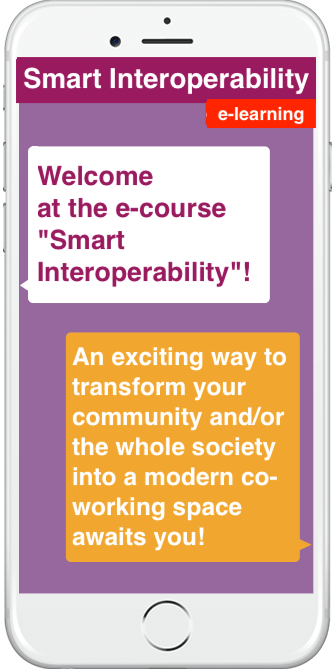The focus of Smart Interoperability is to increase the benefits for various groups. The course focuses on practical results. Accordingly, you will not only be able to get acquainted with the original approaches and IT tools, but also will be able to start practical implementation even while studying. For citizens, representatives of local authorities and state ones, non-profit organizations, foundations, business and mass media.
First view
“Smart Interoperability” can begin with the stating of the local issues with the direct participation of residents. But unlike static markers on the map for visualization while mapping communities, using special interactive “beacons”, through which you create a space for live interaction in the community. This relates to the problem-solving proposals, the mobilization of resources from various sources, including co-financing with donors / business / investors, residents, local budgets and many other opportunities you will learn from this course. Check, please, the visualization of the opportunities on video from our partners. After the video, we recommend to look for more information.

Certification
For residents – the certificate “Smart Citizen”. You shave to master the Smart Citizens component. For the media, new media and bloggers, this component also will be enough.
For NGO representatives – Certificate “Smart Civil Society”. You have to master two components: Intelligent Citizens and Intelligent Non-Profit.
For representatives of authorities – Smart Management Certificate. Yu have to master two components: Intelligent Citizens and Intelligent Power
.For representatives of donors (business) – Certificate Smart Impact. You haveto learn the component “Intelligent Donors”, the “Smart Citizens” component is recommended.
Training materials are free and available to everyone at any time. However, we recommend that you firstly sign up for a course that will allow you to access support / assistance (help button) and certification based on your training.
Reviews

Local citizen 1 (he): “It was so cool to be a participant of this e-learning. I feel myself a human being, a citizen who takes care about the life of the community. It’s nice to communicate with the same people who are not indifferent to the surrounding problems. I like the openness, transparency, objectivity, mutual help in solving problems”.
Local citizen 2 (she): “Upon completion of the course, I am ready to conduct a local study-workshop for local authorities, NGOs and residents for implementation “Smart Interoperability” as my in-kind.
Check the British Council’s response to Ukraine from the pilot implementation of Smart Interaction approaches and tools for the Active Citizens Program.
component 1: "Smart Citizen"




Troubles Hunters
MODULE 1:
Residents, who has signed up by their mobile (or other device), mark the problematic or attractive places and questions. These tags are called “beacons” on the community map.
Almost every day we are faced with factors around which cause negative or positive emotions. So, “Problems’ Hunters” is the most accessible role for the overwhelming majority of residents. Accordingly, the training includes the minimum necessary topics: how to join the system (creating an account), how to create and remove your beacon, how to draw attention to their beacons and view the answers and suggestions on their beacons.
At the request of the local authorities, it is possible to develop a number of interesting services, or integrate them into existing ones; this will be taught in the “Smart Power” component (similarly – “Smart NGOs”).


Trouble Solvers,
Social Entrepreneurs
MODULE 2:
Those who are involved in the solution of defined problems. Usually it can be anyone who has a competence in solving of the indicated problem: residents, NGO representatives, authorities, business. In this component, we learn first of all as inhabitants on the following topics: to give an advice in comments to the beacon, to create a draft resolution of the issue, an overview of the steps to raise funds for the project by the method of crowdfunding and submission to a grant, responding to the growth of demand (dissemination of the draft decision on several issues of problems).
Social Investors
MODULE 3:
Those who make resources (time, money, etc.) to solve the problem. Usually these can be residents themselves, NGOs, local budgets, business people, residents of other countries, international donors. In this component we learn first of all as inhabitants of the basic tools. The proposed system provides users with unique capabilities to control their funds, which you will not see anywhere else. You will learn about the basic functions, such as how interested residents can provide assistance without signing in, how and what personal funds are created for, how to provide and repay their funds at the moment.


Searchers, Media
MODULE 4:
Here we are talking about how to find the information and some possibilities for its display. You’ll learn about the search and filtering tools, statistics on how to create your own mobile app and how to set up local / hyperlocal media on your mobile phone to display real-time selected information on your own site.
The display of selected information on its own site (including local authorities, NGOs, mass media, business) is another attractive step for the introduction of “Smart Interoperability.”
component 2: "Smart NGO"
(NGOs - non-institutional organizations: civic organizations / associations, charitable foundations, associations, etc.)

Smart NGO
component 2:
This module will be useful for representatives of registered organizations with a non-profit code (public and charitable organizations, funds, condominiums, etc.).
NGOs have a unique role and interesting opportunities in the developed system. Basic training includes the following topics: Creation of own Spheres / Layers of information on the map, NGO co-operation with Hunters on problems, Interaction of NGOs with social entrepreneurs (project administration), NGOs as Problem Solver, Fundamentals of Social Investing for NGOs, Interaction with other NGOs (within project, coalition, association, etc.)
component 3: “Smart Authority”
Smart Authority
component 3:
This is a special module for representatives of public authorities and / or local self-government bodies. The “Smart Interoperability” initiative includes a number of benefits for attracting people, organizing and implementing effective services and approaches in the social and economic spheres.
Basic training includes the following topics: Creating your own thematic Spheres / Bars of information on the map, CMS / Administration Interaction with Hunters on Problems, CMS / Administration as Problem Solver, Fundamentals of co-financing from various sources, Adaptation of existing CMS / administration procedures to Intelligent Interaction, Interaction with other communities (OTG: Common interests of communities, etc.)

component 4: "Smart Donor"

Smart Donor
component 4:
This is a special module for representatives of international and local donors who are legal entities as well as business representatives. Intelligent Interaction provides the necessary transparency and justification for decision making, direct funding and / or pooling of resources for co-financing.
(access to educational materials will be opened later)
TRANSFORM YOUR COMMUNITY TO A COWORKING SPACE BY IT
This online course was created by the NGO “Youth Corporation” for the needs of the “Smart Interoperability” initiative and the “Active Citizens” program of the British Council in Ukraine;
This web-site was created with the participation of the Young Community Foundation and support of the Global Fund for Community Foundations


